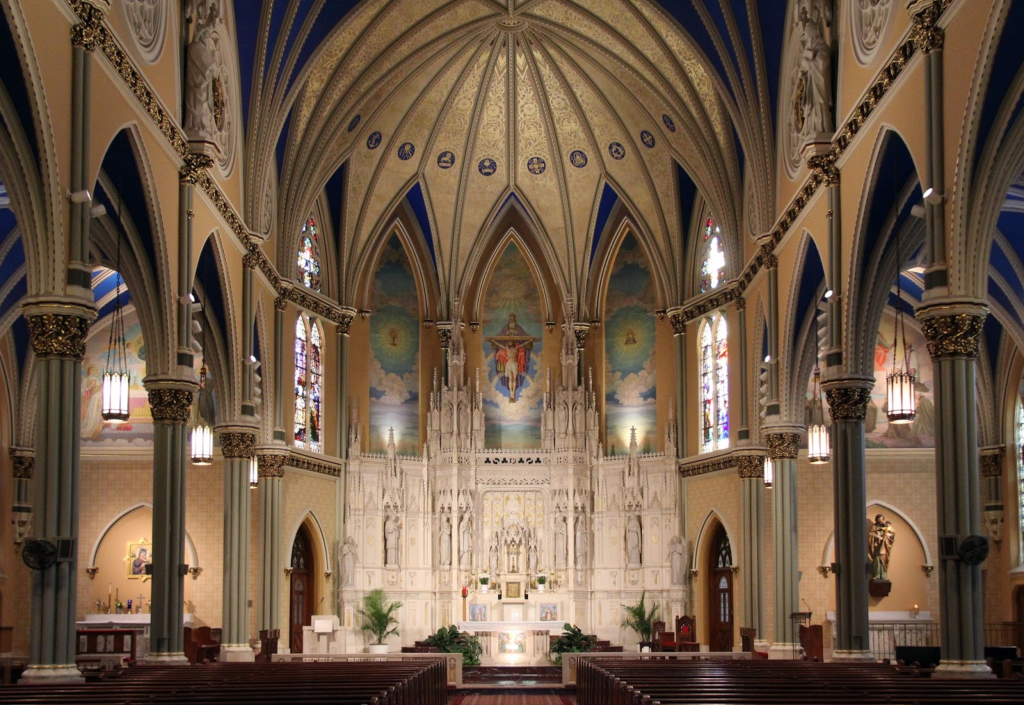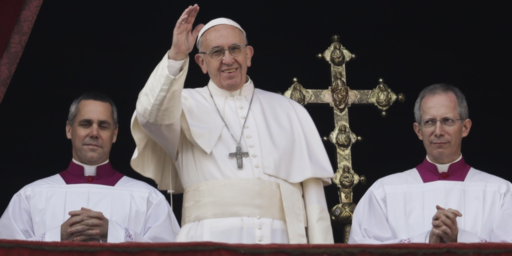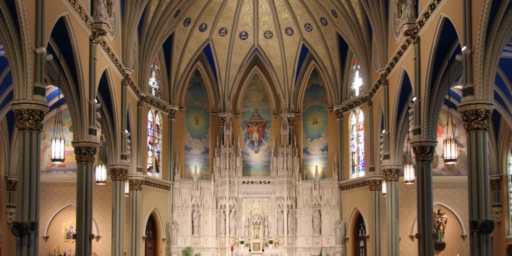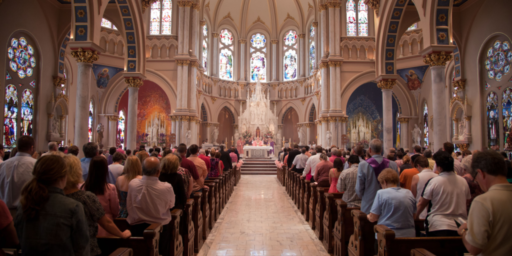Vatican Vetoes U.S. Bishop’s Plan To Deal With Sex Abuse Crisis
In what seems like another effort at a cover-up, the Vatican vetoed a plan by American Bishops to address the Catholic Church's abuse scandal.

In the latest example of the extent to which the higher levels of the Roman Catholic Church continues to mishandle the sex abuse scandal that has gripped the Roman Catholic Church for decades now, The New York Times is reporting that the Vatican put a stop to a plan that had been developed by the Catholic Bishops in the United States to deal with the crisis:
BALTIMORE — Facing a reignited crisis of credibility over child sexual abuse, the Roman Catholic bishops of the United States came to a meeting in Baltimore on Monday prepared to show that they could hold themselves accountable.
But in a last-minute surprise, the Vatican instructed the bishops to delay voting on a package of corrective measures until next year, when Pope Francis plans to hold a summit in Rome on the sexual abuse crisis for bishops from around the world.
Many of the more than 350 American bishops gathered in Baltimore appeared stunned when they learned of the change of plans in the first few minutes of the meeting.
They had come to Baltimore wanting to prove that they had heard their parishioners’ cries of despair and calls for change. Suddenly, the Vatican appeared to be standing in the way, dealing the bishops another public relations nightmare.
“We are not ourselves happy about this,” Cardinal Daniel DiNardo of Houston, the president of the United States Conference of Catholic Bishops, said at a midday news conference. “We are working very well to move to action, and we’ll do it. We just have a bump in the road.”
The order from Rome is the latest twist in a long power struggle between the American bishops and the Vatican over how to respond to the abuse crisis. For nearly three decades and three papacies, the United States has been the focal point of the crisis, and the American bishops have been pushed to the forefront of the church’s response.
The Vatican also applied the brakes in 2002 when the Americans took steps that had not been adopted by the global church, like establishing a “zero tolerance” standard for abusive priests and a national review board made up of laypeople.
The new delay was immediately denounced on Monday by abuse survivors and advocates who had traveled to Baltimore from across the country to put pressure on bishops to take action.
“This is a disaster, and I think it’s a dark day for Catholics, especially victims and survivors,” said Anne Barrett Doyle, co-director of BishopAccountability.org, a research and advocacy group based in Boston. “When the Vatican intervenes, regulations get weaker, not stronger.”
Peter Isely, an abuse survivor from Wisconsin and leader of Ending Clergy Abuse, an advocacy group, said in an interview: “This is a completely cowardly decision by the American bishops. They could still vote on it, and let the Vatican rescind the votes.”
Many Catholic commentators have called the abuse scandal the greatest crisis in the Catholic Church since the Reformation.
(…)
The great unfinished business of the long-simmering abuse scandal has been the failure of the bishops to discipline themselves. American bishops passed a “charter” of measures in 2002, after the scandal erupted in Boston, but those steps were focused on discipline for abusive priests.
The initiatives that the American bishops had planned to debate and vote on in Baltimore included creating a hotline for reporting accusations against bishops, a lay review board to hear the allegations, and a mechanism to permanently sideline bishops who are judged to be abusers themselves. They also intended to decide on a proposed bishops’ code of conduct.
The bishops knew they were under intense scrutiny and felt a need to show that they were taking action.
“I hope this doesn’t look like a dodge,” Bishop Christopher J. Coyne of Burlington, Vt., said of the Vatican’s delay order in an interview.
Bishop Coyne said the postponement was actually helpful in some ways, because the bishops had received the text of their proposed measures only a week ago, and here were many amendments that needed to be debated and put to a vote.
“Coming into the meeting, I wasn’t all that hopeful we’d be able to accomplish as much as we wanted to,” said the bishop, who leads the conference’s committee on communications.
Cardinal DiNardo said at the news conference that he did not know whether Pope Francis himself had requested the delay. He said that when he met with the pope in October, Francis was “very positive.”
The cardinal said he learned of the delay order only on Sunday, in a letter from the Vatican office known as the Congregation for Bishops.
He suggested that the Vatican’s objections could be related to “cultural heritage.” While he did not elaborate on what that meant, the Americans’ urgency to act has sometimes been dismissed by the church’s predominantly Italian headquarters at the Vatican.
For many years it seemed as if the Catholic Church’s abuse scandal had largely faded away. Over the past decade or so, several Priests have been prosecuted, as have a handful of Bishops who helped to cover up abuse in their diocese. In reality, though, the scandal has been brewing beneath the surface both internationally and here in the United States. Specifically, the Church in the United States has also been dealing with the report issued in August by a Pennsylvania Grand Jury regarding sexual abuse by Catholic clergy in the state and the role that Church hierarchy played in covering up those reports by methods such as moving Priests from one Parish to another, or otherwise reassigning them to duties where they would be outside the jurisdiction of local authorities. After several years of investigation, the Grand Jury uncovered more than 300 instances of Priests involved in the abuse of as many as over 1,000 children over the years that the investigation covered. The report found cases of abuse that covered nearly all of the state’s diocese and included actions or omissions by several Bishops and other Church authorities. The most prominent name on that list was Donald Wuerl, who had been the Bishop of Pittsburgh before being promoted to become Archbishop in Washington, D.C. Wuerl was later elevated to Cardinal. Last week, after pressure from several quarters, Pope Francis accepted Wuerl’s resignation, although he remains in his position pending appointment of a successor.
In addition to these states, the Attorneys General of Illinois and Louisiana have stated that they are open to an investigation of some type, and the Federal Government has opened its own investigation and taken the step of notifying Church officials around the country to ensure that any documents in their possession or control regarding the scandal are preserved for possible future subpoenas. This notification, which puts the subject of an investigation on notice and could be grounds for future charges of obstruction if it is not complied with, was sent to all 145 diocese and 32 diocese in the United States, a strong indication of just how sweeping the Federal investigation is likely to be and that it is likely to be an investigation that lasts for a considerable period of time. Finally, and most recently, eleven states announced in late October that they were opening their own investigations into the Church, bringing the number of active investigations up fifteen which includes the Pennsylvania, Illinois, and Lousiana investigations and the newly opened Federal investigations.
Given all of this, it isn’t surprising that the Catholic Bishops in the United States would want to come up with a coordinated response that would both help deal with the ongoing investigations and provide the laity with the answers they’ve been demanding for decades. Instead of being able to do that, though, they now find themselves roadblocked by Rome from even trying to provide those answers. This is the same kind of strategy that the Church has followed in the past, and there is no reason to believe that it will work any better this time than it has in the past. If the Church were really interested in coming clean here, they would open the books on this scandal, both with regard to the records of the diocese in the United States, which is effectively what the U.S. Bishops wanted to do, and the Church in Rome itself. Doing this, of course, could end up exposing the Church to legal liability but if it is ever going to get this behind it the church is going to even come close to repairing its reputation that’s exactly what it is going to need to do.
The Washington Post’s explain what might be behind this latest Vatican action:Bill McCormack tries to
The many possible reasons all arise from the complicated dynamics of Catholic Church governance. For one, the church has come to see clerical sex abuse as a global issue, not a problem isolated in a few countries such as Ireland or the United States. The church has thus increasingly seen the need for a global solution. The Vatican might be hoping that a more united front will emerge from a February 2019 meeting of bishops that it has called on this issue.
The bishops’ proposals might also have run afoul of the clergy/laity distinction in the Catholic Church, as one proposal would assign a lay commission the authority to investigate allegations against bishops — which the Vatican may have considered as going too far. While many U.S. and European Catholics regularly call for lay people to be more directly involved in church governance, many Vatican leaders think the bishops themselves should oversee reforms.
But what is most likely is that the pope, and the pope alone, has the responsibility of overseeing the bishops. The Vatican would want to seriously scrutinize any proposals to dilute that papal authority. Some Catholic reporting outlets have suggested that Vatican insiders think the bishops’ proposals may violate church law or that the Vatican did not have enough time to review the proposals. Those suggest concerns about the pope’s primacy.
It’s also possible that the Vatican is trying to shift the bishops away from seeing new institutions as a solution to the crisis. Pope Francis tends to play down the importance of institutions; for instance, he argues in his letter Evangelii Gaudium that it is fruitless to create institutions without engendering “new convictions and attitudes.” The Vatican commission set up to investigate clergy sexual abuse has itself been criticized for controversy and inactivity. As one U.S. bishop noted, the pope could be asking the bishops to take greater account of the bishops’ own “need for personal conversion” that would lead them from “ecclesial power” to “true servant leadership.” In other words, Pope Francis may think the resolution will come through changes in attitudes, not only or primarily through new institutions.
(…)
This delay also risks further loss of public trust in the Catholic Church. In January 2018, 45 percent of U.S. Catholics felt that Francis was doing a “good” or “excellent” job of handling the sex abuse crisis, according to the Pew Research Center, while 46 percent felt his performance was “only fair” or “poor.” By September 2018, after the devastating summer revelations, the approval rating had dropped to 31 percent and disapproval had risen to 62 percent. Already, activists are protesting the Vatican’s decision to halt the bishops’ deliberations. Francis remains popular, but this scandal may be starting to diminish that popularity.
Gee, do ya think?




Meet the new boss, same as the old boss*
* from the Who song, “Won’t get fooled again”
I find it hilarious that the same people (a.k.a. You Know Who over at TAC) who complain bitterly about “lack of freedom of religion” in the US will then turn around and scream at the top of their lungs about stuff like the Vatican doing what they please with their bishops.
I guess Freedom of Religion only holds when you’re upsetting Teh Libz and supporting cake bakers to refuse making cakes for gay marriages.
I eagerly await a statement from the Vatican explaining the reasoning behind this. Without that, it seems like they are just stonewalling to protect pederasts.
The Church shouldn’t get the benefit of the doubt in this, with speculation of good reasons to delay, liberal pope or not.
Everything stops at the walls and gates of Vatican City. The US Catholic bishops need to look at their options, one of which should be a cut off of funds to Rome. Maybe they should take a look at how Martin Luther (Sola Scriptura) and King Henry VIII (Defender of the Faith) handled the Vatican.
@Tyrell:
Interesting point. The doctrinal differences between Roman Catholicism, Anglo-Catholicism/Episcopalianism, and Lutheranism are are fairly minute. So why not separate?
But I suspect that the allegiance to Roman Catholicism on the part of at least some of its practitioners is tribal/ethnic in nature. Roman Catholics were scorned in large parts of the U.S. well into the 20th century. It’s possible that some memory of how their grandparents were treated by the WASPs is at the core of their attachment to the RC church.
I know I’m repeating myself, but at some point Roman Catholics need to figure out that child rape is not a bug in the church, but a feature. Raping altar boys is a perk of employment as a priest. You cannot have a practice at once this heinous and this widespread and this persistent over time, and go on pretending that the Roman Catholic church is not committed to the right of priests to rape, and to be protected from civil law by the hierarchy, going all the way up to the Pope.
@Michael Reynolds:
The allegiance of some RCs to their church is similar to the fealty Trumpkins swear to Trump. It doesn’t matter what either the RC church or Trump says or does: Their devotees will never abandon them. With the former, it has nothing to do with religion, and with the latter, it has nothing to do with logic.
@Gustopher: While I was living in Korea, I had a lengthy discussion about this topic with a theologian at the Lutheran university where I was teaching at the time. Even talking to a Lutheran, it was like I had not only fallen down the rabbit hole (through the looking glass? take your pick), but also landed on my head. Wa! The degree to which the participants are retaining to themselves and/or submitting to “authority” is breathtaking.
ETA: One of the interesting parts of my discussion with this theologian was that he would declare that my objection, based on what scripture taught, “didn’t matter, this is outside of scriptural authority.” [huh?] As to how people stay when there is so little difference among Catholics, Lutherans, and Anglicans is that the second and third groups, until recently, were still excommunicated and considered heretical. Eternity in hell for “close, but no cigar” is a powerful force. It may take generations for the change to reach the laity.
Catholics have a deep sense of history. There have been perv priests and popes before. What hwe have is what we believe is truth. You libs didn’t stop believing because of Bill Clinton, because you believe in an idea, not a person. You need to show other people the same respect. Also, just because some theological point seems small to you doesn’t mean it is. Some “little” point of disagreement can change a church over hundreds of years. If you have an understanding of history, you can see these things.
@just nutha: That would have been an interesting conversation. The big issue that Luther had, and that the Reformation was built on was church authority. Luther and other reformers said the authority was from the Bible, not the priests, bishops, Cardinals, deacons, synods, pope, or church bureaucracy. We see this going on today as some of the main line denominations have left Biblical authority. As a result they have lost churches and millions of members: Episcopal Church US, Presbyterian Church USA, and the ELCA are examples.
@Tyrell: Biblical authority and church authority don’t have to be either-or. Luther made that mistake. The Bible supports Peter’s and the Apostles’ authority, and the Catholic Church promotes the Bible. There’s no conflict. You can debate some theological points, but you can always reconcile the Church and the Bible. Luther started with one “little” disagreement and it got out of hand, and contributed to 500 years of conflict. At the Last Supper, Jesus prayed for the people who follow the Apostles – us – and prayed more than anything that they be one. No one caused more division than Luther.